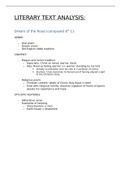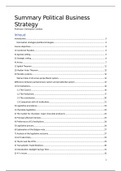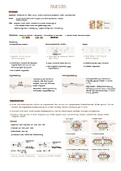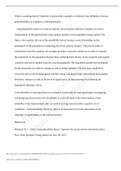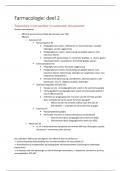Dream of the Rood (composed 8th C):
GENRE:
- Oral poem
- Dream vision
- Old English riddle tradition
CONTENT:
- Elegiac and heroic tradition
o Especially: Christ as heroic warrior (lord)
o Also: Rood as failing warrior => warrior standing by his lord
Initially: humiliation over his role in crucifixion of Christ
Evolves: Cross becomes to feel proud of having played a part
in the Christian story
- Religious poem
o Christian content: death of Christ, Holy Rood (=tree)
o Ends with religious homily: dreamer (speaker of frame of poem)
speaks his repentance and hope
STYLISTIC FEATURES:
- Alliterative verse
- Examples of kenning
o Voice-bearers = men
o Earth-house = elsewhere
,Beowulf (MS c. 1000)
1. Background
- Author unknown
- Location unknown: West Saxon? Anglian?
- Composition date unknown: between 700-900
- Orally transmitted until ca. 1000
- Survives in a single medieval manuscript by unknown scribe
o British Library
o Damaged by fire
2. Story
- About the heroic deeds of the Geatish warrior prince Beowulf
- Describes 2 moments in Beowulf’s life: youth & old age
Beowulf tells of two major events in the life of the Geatish hero Beowulf:
the first when, in his youth, he fights and kills first Grendel, a monster who
has been attacking Heorot, the hall of the Danish king Hrothgar, and then
Grendel’s mother who comes the next night to avenge her son; the
second, 50 years later, when Beowulf, who has for a long time been king
of the Geats, fights a dragon who has attacked his people, in combat in
which both Beowulf and the dragon are mortally wounded.
Beowulf, a warrior prince from Geatland in Sweden goes to Denmark and
kills the monster Grendel that has been attacking the great hall of Heorot,
built by Hrothgar, the Danish king. Grendel’s mother, a water-monster,
takes revenge by carrying off one of the king’s noblemen, but Beowulf
dives into the underwater lair in which she lives and kills her too.
Returning home, in due course Beowulf becomes king of the Geats.
50 years later, Beowulf’s kingdom is ravaged by a fire-breathing dragon
that burns the royal hall “in revenge for the theft of a goblet from its
treasure hoard”. Beowulf, aided by a young warrior, Wiglaf, manages to
kill the dragon, but is fatally wounded in the course of the fight. He
pronounces Wiglaf his successor. The poem ends with Beowulf’s burial and
a premonition that the kingdom will be overthrown.
3. Geographical Setting
- Not set in England
- Set in Scandinavia
o Some of the Anglo-Saxons’ ancestors hailed from there
, o Beowulf: Geats and Danes, references also to Swedes and
Frisians
4. Genre
- Heroic poem
- Battle scenes
- Elegiac elements
- Religious elements
5. Themes
- Desire for order/threat of disorder
- Complex interaction of pagan and Christian traditions
o Heroic code (vengeance; honour; ethnic pride)
o Christian values (compassion; critique on feuds & violence)
BEOWULF: OVERVIEW FRAGMENTS
II. 1-143: Opening Lines
- Sets forth poem’s central ideas: ethnic pride; force of reputation;
heroic code; Christian tradition
- Stylistic features of Anglo-Saxon poetry
o Kenning: ‘cloud-murk’ (‘fog’); ‘treasure seat’ (‘throne’)
II. 703-807: Grendel’s Attack
- Grendel associated with evil & devil
o “God-cursed Grendel”
o Girth with God’s Anger”
II. 2200-2270: The Dragon
- Geatland threatened by dragon
o Act of vengeance for theft of goblet from its treasure hoard
- Elegiac flashback
o Speaker relates how centuries earlier the last survivor buried the
treasure (ambiguity of materialism)
II. 3137-3155: Beowulf’s funeral
- Beowulf’s funeral
o The dirge (woman’s funeral song)
- Another elegiac fragment
o Now with implications for all Geats (demise of kingdom)



